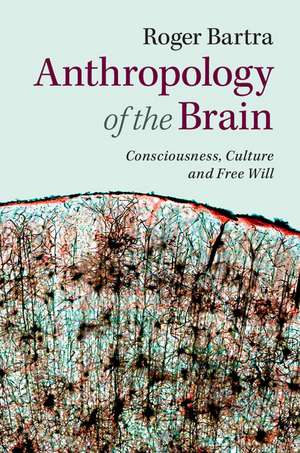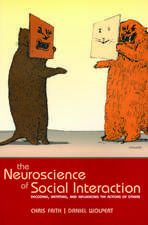Anthropology of the Brain: Consciousness, Culture, and Free Will
Autor Roger Bartraen Limba Engleză Hardback – 4 iun 2014
| Toate formatele și edițiile | Preț | Express |
|---|---|---|
| Paperback (1) | 176.51 lei 6-8 săpt. | |
| Cambridge University Press – 4 iun 2014 | 176.51 lei 6-8 săpt. | |
| Hardback (1) | 490.65 lei 6-8 săpt. | |
| Cambridge University Press – 4 iun 2014 | 490.65 lei 6-8 săpt. |
Preț: 490.65 lei
Preț vechi: 551.29 lei
-11% Nou
Puncte Express: 736
Preț estimativ în valută:
93.90€ • 97.91$ • 78.04£
93.90€ • 97.91$ • 78.04£
Carte tipărită la comandă
Livrare economică 20 martie-03 aprilie
Preluare comenzi: 021 569.72.76
Specificații
ISBN-13: 9781107060364
ISBN-10: 1107060362
Pagini: 208
Dimensiuni: 155 x 235 x 16 mm
Greutate: 0.45 kg
Ediția:New.
Editura: Cambridge University Press
Colecția Cambridge University Press
Locul publicării:New York, United States
ISBN-10: 1107060362
Pagini: 208
Dimensiuni: 155 x 235 x 16 mm
Greutate: 0.45 kg
Ediția:New.
Editura: Cambridge University Press
Colecția Cambridge University Press
Locul publicării:New York, United States
Cuprins
Part I. Consciousness and Symbolic Systems: 1. The hypothesis; 2. Evolution of the brain; 3. Brain plasticity; 4. Is there an internal language?; 5. Amputations and supputations; 6. The atrophied exocerebrum; 7. The symbolic substitution system; 8. Neuronal mirrors; 9. Consciousness within hand's reach; 10. Outside and inside: the immense blue; 11. The musical spheres of consciousness; 12. Artificial memory; 13. The lost soul; Part II. Brain and Free Will: 14. The hands of Orlac; 15. Does free will exist?; 16. An experiment with freedom; 17. The moral brain; 18. Unchained reasons; 19. Freedom in play; 20. External symbols; 21. Final reflections.
Recenzii
'Anthropologist by training, and today a leading public intellectual and social theorist in Latin America, Roger Bartra here dextrously argues that the plasticity of cultural and social networks facilitate a 'prosthetic' connection to the brain and consciousness.' Matthew Gutmann, Brown University
'A daring and brilliant hypothesis, and yet another intellectual debt we owe to one of the premier thinkers of our time.' James D. Faubion, Rice University
'… this ground-breaking anthropological study reveals the brain as an external - social - organ.' John Kraniauskas, Birkbeck, University of London
'… a thorough and provocative analysis of the nature of consciousness and free will from the perspective of an anthropologist with a deep knowledge of neuroscience, sociology and philosophy. The author challenges reductionist views on these perennial themes, while highlighting the importance of cultural and social networks in the definition and in the genesis of consciousness. This must-read authoritative work is a valuable reference source for neuroscientists, philosophers, as well as social and cultural anthropologists. No doubt this book will stir up a much needed debate, particularly within the neuroscience community; neurobiologists in general consider consciousness exclusively as a phenomenon that takes place inside the brain of the subject, producing awareness of the self, but largely ignoring 'culture' and 'the other'.' F. Javier Alvarez-Leefmans, Wright State University, Boonshoft School of Medicine
'A daring and brilliant hypothesis, and yet another intellectual debt we owe to one of the premier thinkers of our time.' James D. Faubion, Rice University
'… this ground-breaking anthropological study reveals the brain as an external - social - organ.' John Kraniauskas, Birkbeck, University of London
'… a thorough and provocative analysis of the nature of consciousness and free will from the perspective of an anthropologist with a deep knowledge of neuroscience, sociology and philosophy. The author challenges reductionist views on these perennial themes, while highlighting the importance of cultural and social networks in the definition and in the genesis of consciousness. This must-read authoritative work is a valuable reference source for neuroscientists, philosophers, as well as social and cultural anthropologists. No doubt this book will stir up a much needed debate, particularly within the neuroscience community; neurobiologists in general consider consciousness exclusively as a phenomenon that takes place inside the brain of the subject, producing awareness of the self, but largely ignoring 'culture' and 'the other'.' F. Javier Alvarez-Leefmans, Wright State University, Boonshoft School of Medicine
Notă biografică
Descriere
A novel study on consciousness and the brain that places culture at the center of the analysis.














